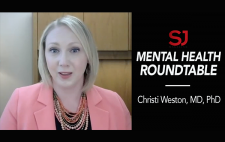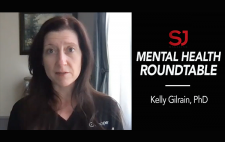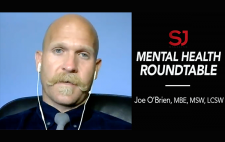As the pandemic and all its restrictions slowly wind down, many people are still struggling mentally and emotionally. Mental health professionals are now faced with helping a population where everyone lived through the same traumatic event – and they did too. For the most part, that’s never happened before. We asked 5 mental health professionals to talk with us about just how difficult it’s been and how we can help our families, and ourselves, cope with the sadness, the struggles and the change. It won’t be easy, they say, but it’s possible.
Participants:
Marianne Aleardi, Publisher, SJ Magazine
Alex Strauss, MD, Partner, Centra
Lisa Rosenberg, MSW, Director of Camper and Staff Care JCC Camps at Medford
Christi Weston, MD, PhD, Director of Outpatient Psychiatry Capital Health Behavioral Health Specialists-Bordentown
Joe O’Brien, MBE, MSW, LCSW, Supervisor of Clinical Services Inspira Health
Kelly Gilrain, PhD, Director of Psychological Services Cooper University Health Care
How the past year has affected people’s mental health…
We are starting to see where this has really worn folks down. Folks who may not have had mental health issues in the past are now struggling with resiliency and are looking for effective coping skills. But it’s entry back into the world that is really difficult for some, because for them, the pandemic restrictions were very protective. For patients who had social anxiety issues, it was great. They didn’t have to go to school or work. They could just stay at home and be protected, and now it’s hard to get back out there.
Kelly Gilrain
We were surprised that a lot of our patients who already had some mental health issues before the pandemic were actually doing quite well early on, all things considered. They’re used to dealing with being anxious, so they already had some coping skills and a team of people to go to for help.
Christi Weston
This has affected kids’ social development. Kids typically know: When I’m at school, I have one set of expectations on how to behave. When I’m home, I have another set of expectations. But then those expectations were changing every month, sometimes every week. That’s really challenging for adults, let alone kids. So we’re seeing either lack of developmental skills, regression of developmental skills or arrested development.
Lisa Rosenberg
Initially it was a lot of pretty significant anxiety about the what if’s, and how are we going to cope with this, how are we going to manage it. But the whole past year has been a trauma, and now we’re seeing the symptoms of that. People are avoiding certain situations. We’re seeing a lot of heightened emotionality. There is now a lot of worry about what will happen, worry about the losses they have had and the losses they’ll have in the future. We’re seeing that mix of anxiety.
Kelly Gilrain
The age group hit the hardest…
We found that teens, definitely, were hit the hardest and showed the most symptoms. I don’t think we’ve ever had so many teens and adolescents in outpatient treatment. We hired 8 new therapists during the pandemic, and the majority of them see kids and adolescents.
Joe O’Brien
Early data shows that people under 25, especially, have been one of the hardest hit groups, because of all the development that happens in your late teens and early 20s. The people who ended high school and began college – this has probably changed the trajectory of their life. Many are depressed. Studies have shown that suicidal thoughts in this age group were around 40% in the last year, which is staggering.
Christi Weston
Age groups have been affected in different ways. People over 65, the folks who may have had frail health to begin with, have been experiencing loneliness. It didn’t matter where they were. They had to stay at home. The senior care centers went on no visitation. Hospitals didn’t have visitors. They were just very, very lonely.
Kelly Gilrain
When telemedicine isn’t ideal…
I’m having conversations with patients who really want to keep having video visits, but they have agoraphobia. Part of their treatment is to come to my office and see me, to expose themselves to that. For some people, telemedicine is a good alternative. But for others, it’s important for them to leave their house.
Christi Weston
I worked with a lot of kids and adolescents who were struggling and needed a higher level of care, like a partial-care program or an intensive outpatient program, but those programs were virtual. A lot of those programs remain 100% virtual. Now we’re seeing kids who really need in-person connectedness for healing, and that’s still not available.
Alex Strauss
On remote learning…
Online learning was good for some people, but then not good for other people. Students who are socially anxious found online learning to be the greatest thing ever. It took a lot of pressure off. But for the kid who can’t sit still in a classroom, try to sit still in front of a computer screen. And there’s no one there to say, “Why don’t you sit back down?” A lot of kids have really struggled.
Alex Strauss
The kids who had social anxiety are the kids who have been thriving. They don’t have to be on camera. They don’t have to talk to anybody if they don’t want to. They don’t have to leave their bed if they don’t want to. All the things they had been trying to avoid by not going to school have been removed. So I have a lot of parents who are asking, “How do I get my kid back in school?” And the teen is saying, “I don’t want to go back to school. Stop making me go back to school.”
Lisa Rosenberg
On moving on…
We are now seeing people exhibiting symptoms of post-traumatic stress. But I think we can also have post-traumatic growth. People can grow from this. I know that’s hard to hear. But acknowledge the grief. If somebody says, “This stinks. I wasn’t able to walk at graduation or I couldn’t attend this funeral,” let’s grieve that. Let’s grieve the fact that it wasn’t what you wanted it to be. Your hands were tied. It’s important to acknowledge that grief and to grieve it.
Joe O’Brien
 On getting help to people who need it…
On getting help to people who need it…
We’re now dealing with the fact that so many people need our services, and there are so few of us. How can we get the most people the help they need? We’ve had to do that in very creative ways. We’re trying to do more support groups and group therapies so we can help more people. We know people are going to need help. Getting help to those people will be a huge challenge.
Christi Weston
I’m seeing a lot of schools do outreach to community agencies to either bring programming into the schools, whether it’s via health class or through guidance counselors, or they’re doing virtual workshops with families. I was hired at camp this year to oversee behavioral health – a new position – because the staff has a lot of teens and, of course, we have campers. These are the groups we’re talking about having been hit the hardest.
Lisa Rosenberg
Getting an appointment for a mental health visit…
The waitlist at some places is months long right now, because you don’t go in for one session of therapy and fix everything. It’s ongoing. There are not enough psychologists, psychiatrists and therapists to handle the number of people who are seeking support. That’s a real concern.
Kelly Gilrain
We don’t keep a waiting list. We do everything we can to get people in, but right now, if somebody called literally this minute, they would probably be told to call back next week. But it’s usually not too long of a turn-around. We do whatever we can to accommodate folks. But I think when we look back at this our volumes will have increased 40 or 50% during the pandemic.
Joe O’Brien
A study just came out showing no-show rates for telehealth has been much lower, and I’ve noticed that. So we’re actually able to see more people. As long as hybrid can continue, we may be able to see more people just by virtue of having easier access to them.
Alex Strauss
I have psychologists in our primary care services in some of our highly utilized family medicine practices, in pediatrics and in women’s health. If we can catch folks when they’re there for medical appointments, it’s not holding up a spot in a general outpatient office. This is definitely the future of where mental health supports are going.
Kelly Gilrain
I’m connected with a lot of people in South Jersey and the Philadelphia area, and especially with child psychiatry, I don’t know a single one who has immediate availability, unfortunately.
Alex Strauss
 How parents have been affected…
How parents have been affected…
I have these mini-scripts I used throughout the pandemic: It’s ok if your kid doesn’t make it to class, or participate, or if your preschooler is running around the house – it’s ok. Manage your expectations. It’s ok if things aren’t perfect.
Christi Weston
Parents have been in the house with their kids having to be the teacher, house cleaner, chef, and they have to work. They have all these increased potential stressors without the outlet of being able to leave. We’ve all been forced into a situation that nobody could have predicted or prepared for, and there’s this question of how do you take care of yourself in that situation? I use the analogy of being on an airplane and you lose cabin pressure. You’re told to put your mask on first and then help your kids. We need to take care of ourselves to be able to take care of our family.
Alex Strauss
The increase of eating disorders…
Food is often a coping mechanism for many people. When things are out of our control, as the pandemic has been, that starts patterns of disordered eating. We’re seeing so many more eating disorders than in the past.
Lisa Rosenberg
It’s harder to diagnose eating disorders on a telehealth visit. You can’t necessarily see how much someone has gained or lost. Normally I’d weigh someone when they come into my office and I see them in person. But with telehealth, you can wear clothing that modifies the situation a little bit differently than you can in person.
Alex Strauss
We also are seeing a lot of teenagers with eating disorders or at least eating concerns. The therapists here would rarely come to me and say, “Hey, I think this kid is diagnosable with an eating disorder.” That was so rare a year ago, but in the last 12 months it’s been pretty prevalent.
Joe O’Brien
There’s been such an uptick in kids with eating disorders. It’s one thing they can control in this year of everything being out of their control. They can control what they put in their mouth or what they do with food. Unfortunately, it’s an area we often are struggling to find resources for folks, even before the pandemic. It’s just another challenge.
Christi Weston
How couples have been affected…
We’ve had more requests for couples therapy in the last 6 months than I can remember. If there were any cracks in the relationship that maybe people were able to overlook because they were busy – those cracks are starting to spread and rupture now. In those cases it’s really hard for couples to continue to avoid them or gloss over them, because we’re spending so much time together in the same space.
Joe O’Brien
Some folks are doing really well. Having all this time together helped them to relook at their relationship and figure out why they were together. For some of the younger couples who are recently married, it’s a tougher struggle. They’re used to being independent, being out of the house and navigating their own day-to-day. Now they’re stuck in maybe a one- or two-bedroom apartment and they’re on top of each other. And they have no social outlets. They have to figure out if they’re going to grow together or not.
Kelly Gilrain
 What parents should look for in their kids…
What parents should look for in their kids…
Someone pointed this out to me years ago: I’d see my kids after school and I’d say, “Hey, how was school?” And another therapist said, “Why isn’t the first question you ask, ‘How are you doing?’” That’s brilliant. Now I try to make it less about how’s work, how’s school, and more about how are you. If you do that, be sure you really want to know, really be curious.
Joe O’Brien
Listen to your kids instead of trying to give advice. Check in with them, ask age-appropriate, open-ended questions and let them talk. If you ask, “Are you ok,” or “Do you feel sad,” those are yes and no questions. It doesn’t allow them to tell you how they’re feeling.
Lisa Rosenberg
Oftentimes kids will tell me they’ve been asking their parents to see someone, and the parents blow it off. If your kids are asking for help, that would be a really good time to have them talk to somebody. Or if you feel in your gut like something’s off, go get your child checked out, or go visit the pediatrician and let them have a 15-minute chat, because kids are often comfortable with their pediatrician. A pediatrician can be a really good avenue to say yes, I think it might be a good idea to see a therapist.
Alex Strauss
The easiest thing to look for is any changes in behavior. If you notice they’re acting differently, maybe they’re more secretive or their sleep habits have changed, question that. And once it really impacts their functionality – if they’re not sleeping at all or they don’t want to hang out with their friends, if they’re just very different from who they were a year ago, that’s when I would be concerned.
Kelly Gilrain
What to look for in your co-workers…
If you’re close, you could say, “Hey, I noticed you don’t really want to have our weekly phone call, and I just wanted to check in and see how you’re doing. If you need anything, I’m here for you.” Don’t say, “I think you need to see somebody,” or “You need to get help.” That’s how you make sure they won’t get help.
Christi Weston
The pandemic has underscored the importance of regular check-ins with each other. If I’ve never really seemed concerned about how you’re feeling and then I just come out of the blue and start asking you, that may be really awkward. It may be off-putting. But if we just get used to checking in with each other in a very sincere way, then when we’re not doing so well, it may be easier to bring that to the surface and deal with it.
Joe O’Brien
On re-entry…
It is anxiety provoking to go back in the world especially when, for so long, being around people has been what could kill us. We’re now used to not being around people. So there is anxiety, and there is an adjustment. But we can’t avoid it, we have to go out and we have to reintroduce ourselves to the world. We just have to do that in a way that doesn’t feel so overwhelming that it sort of pushes us backwards.
Christi Weston
There’s a high likelihood that when we get to September and remote learning is not an option, the next pandemic will be school refusal from a lot of kids. And school refusal is one of the hardest things to treat.
Alex Strauss
A lot of parents are struggling because their kids are maybe going to in-person summer camp, and that means putting your kids on a bus when they haven’t been on a bus for almost 2 years. Some parents are frozen with anxiety of letting their child go. It’s like starting with a newborn all over again, when you don’t want them to leave your sight because you’re used to having them with you all the time. I’m seeing parents having more separation anxiety than the child.
Lisa Rosenberg
We need to learn to surrender as opposed to submit. Submit has that arm-twisting, forced feel to it. Surrender is self-driven. Surrender is when I say, you know what, this is the way things are, I’m not going to be able to change these things, so I need to learn to move with them, to feel my way through them.
Joe O’Brien
I always say the goal of therapy is learning to be comfortable being uncomfortable. Once we can master that, we can do anything because that’s part of life. As we work on reopening life, we need to remind ourselves it’s ok that you are uncomfortable being around people now. We need to normalize those fears so people can begin taking those baby steps back into re-entry.
Lisa Rosenberg
Watch videos from the night’s discussion here.


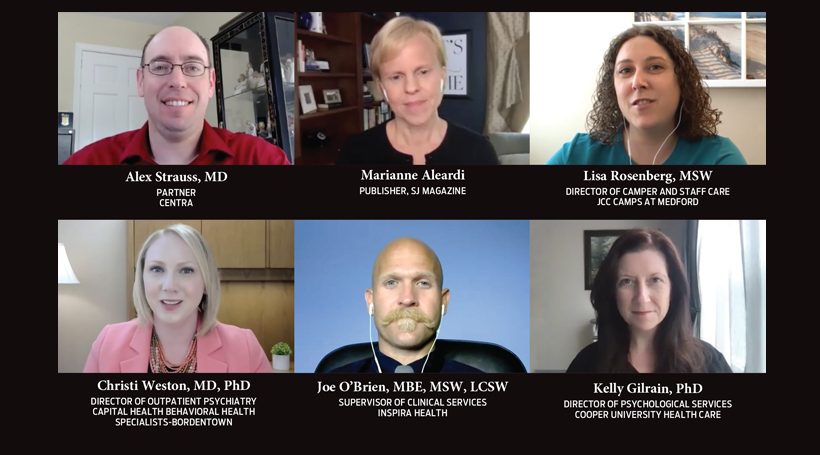
 On getting help to people who need it…
On getting help to people who need it…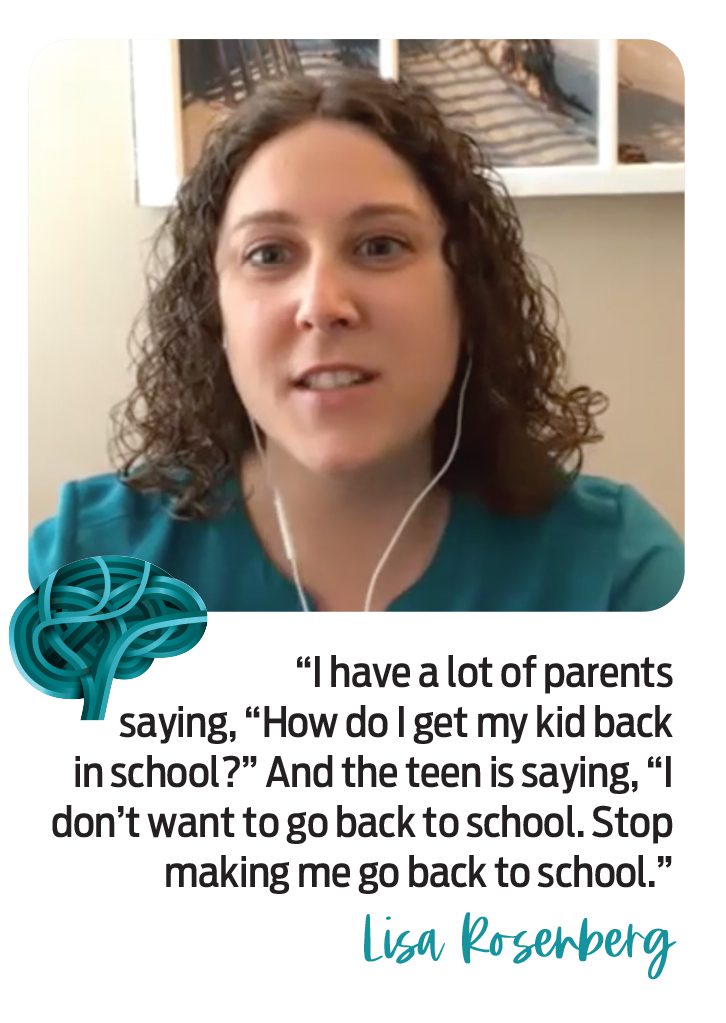 How parents have been affected…
How parents have been affected…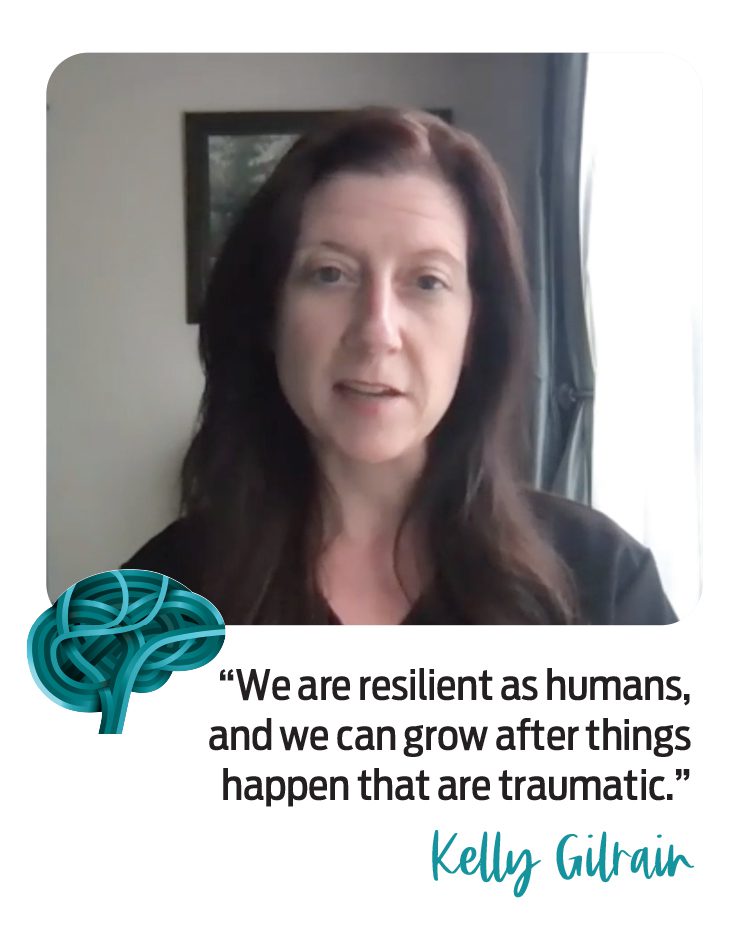 What parents should look for in their kids…
What parents should look for in their kids…